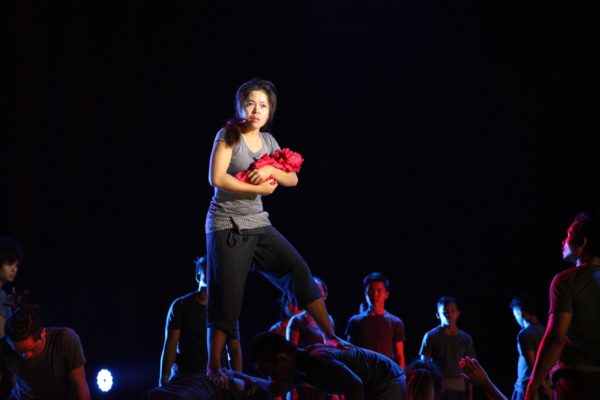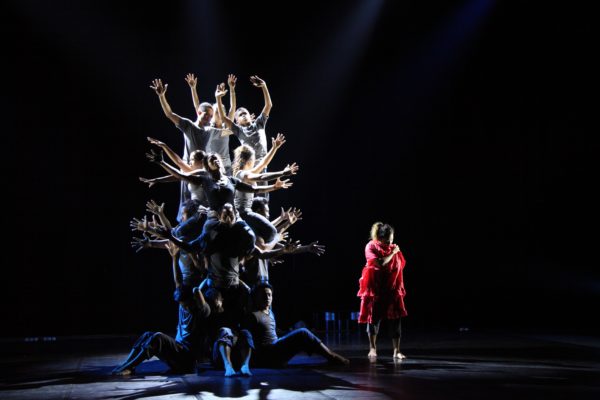Dance Review: “See You Yesterday” — Airing Nightmares
By Debra Cash
The horrors portrayed in See You Yesterday are facts, but this show does not yet address the meaning a new generation can make of those facts.
See You Yesterday, a Global Arts Corps production directed by Michael Lessac with Phare Performing Social Enterprise and Phare Ponleu Selpak Association and Amrita Performing Arts, presented by Arts Emerson at Emerson Paramount Center Robert J. Orchard Stage, through May 19.

The cast of “See You Yesterday. “Photo: Jacqueline Lessac.
Cambodia Year Zero was 1975. That year, Pol Pot and his Khmer Rouge regime declared the beginning of revolutionary time. During the next four years, nearly two million people would be forced from their homes, their occupations, and their families and lose their lives to starvation, summary execution, and quixotic hard labor intended to return Cambodia to an imagined prelapsarian peasant society. A quarter of the population, along with the vast majority of the country’s artists and intellectuals — even people perceived as educated because they wore glasses — perished.
Two generations have grown up since the Killing Fields, both within Cambodia’s borders and in diaspora communities like Lowell, Mass. See You Yesterday, produced by the Global Arts Corps with the young artists of Cambodia’s Phare Circus, occupies Arts Emerson’s sweet spot: it combines elements of circus (as in the recent, poetic engagement of When Angels Fall and the regularly appearing absurdist narratives of Montreal-based Seven Fingers) with an artistic project that emerges from a culture’s distinct history of trauma to illuminate how that history has shaped the contours of both personal and collective identity.
See You Yesterday is structured like a series of intrusive nightmares. Agile circus folks in simple grey T-shirts and trousers gathered at the ankle are warming up when the audience arrives, contortionists curling their feet over their heads to touch toes to foreheads, men juggling clubs. A smiling man briefly takes the role of emcee, claiming in Khmer-accented English that, like Bostonians, he is a hockey fan, and walks across the stage using a ladder like a shaky pair of stilts. There will be more of this here-and-now aspect as the performance goes on, with a show of tumbling passes, friendly martial arts sparring, a hip-hop interlude from Siem Reap by way of the South Bronx, and diabolo juggling where the lassoed, colored spool seems to hover as the still point in a net of energy. Not all the acrobatics come off — on opening night, dropped juggling balls and scary, off-balance catches came a bit more often than one would wish — but the feeling was of a community where each person understood the skills and roles at hand and supported each other’s aspirations.
But that was now. While Global Art Corps is tasked with bringing dialogue to “people who fear, disdain, mistrust and even hate each other,” Phare Circus director Khuon Det, who was born in Battambang in 1972 and spent most of his youth in a refugee camp on the Thai border, is aware that during the Cambodian genocide, neighbors who knew each other well were both perpetrators and victims of the mania of violence. See You Yesterday doesn’t flinch from portraying the way the same leadership capacities that enable a woman to serve as a reliable mentor and spotter to circus artists might, under the different circumstances of a murderous ideology, be just the talents to command torture, or how a victim, under enough pressure from authority figures, could be transformed into a zealous child soldier.

The cast of “See You Yesterday.” Photo: Jacqueline Lessac
From scenes of men and women forced to stoop to sow rice in endless paddies, to images of victims flailing and collapsing with their hands behind their backs, the performers use their acrobatic expertise to enact grim remembrances. There are occasional hints of Cambodian culture: the mask of the scampering monkey Hanuman becomes a skull, and an apsara slopes her fingers backwards as she flexes her foot behind her in the classical Khmer dance reference to an angel in flight.
The loveliest — and most arresting — visions in See You Yesterday are scenes where the performers mass their bodies in precarious piles and balances to portray caves and promontories and riverbanks, creating a landscape that enables some lucky people to hide and to escape. They become, in their very flesh, home and flight from home.
The horrors portrayed in See You Yesterday are facts, but this show does not yet address the meaning a new generation can make of those facts. Maybe these artists are not yet ready. Maybe the nightmares simply need to be aired before they can be examined. Maybe these young artists need to step away from their parents’ and grandparents’ yesterdays and just enjoy being young, and strong, and alive, in order to get through today intact.
Debra Cash, a founding contributor to the Arts Fuse now serving on its Board, is Executive Director of Boston Dance Alliance. She spent a month as a journalist working in the Cambodian refugee camps in Thailand in February, 1980.
